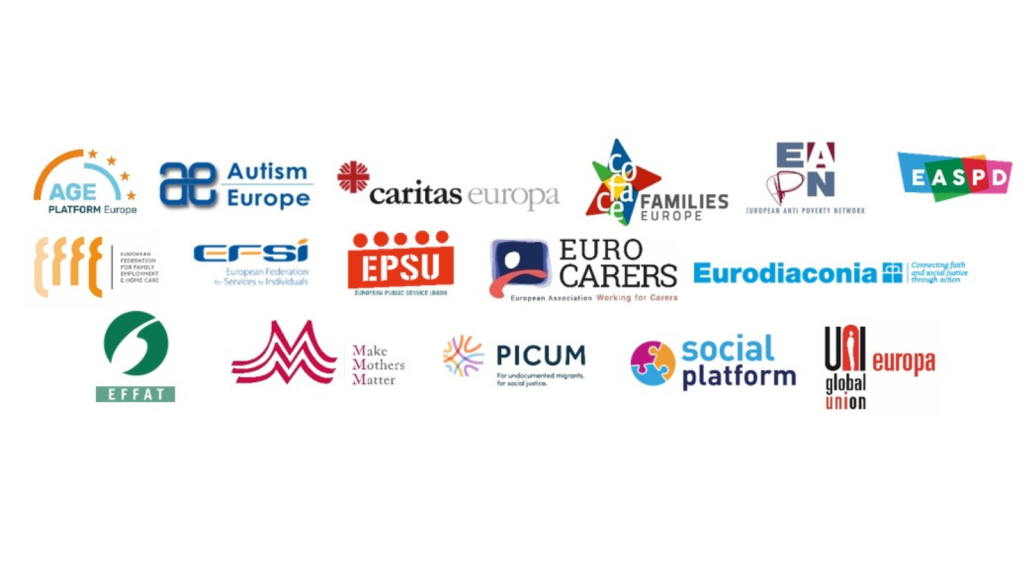Brussels, 7th March 2021
First impressions by Elizabeth Gosme, Director of COFACE Families Europe
Twenty principles, three headline 2030 targets, a revised EU Social Scoreboard, a clear timeline of initiatives, and a shared political commitment and responsibility from European to local level. Using the COFACE recommendations as a benchmark, here below are my first impressions on the European Pillar of Social Rights action plan published on 4th March 2021.
1.Two-generation approach to policy-making.
The interrelated well-being of children and their parents is reflected to a great extent in the action plan. Different types of family supports are referred to, directed at children and their parents: work-life balance measures which will have a strong social and economic impact, investment in early childhood education and care (ECEC), poverty reduction with an explicit target also on child poverty, as well as the upcoming Child Guarantee (in the form of a Council recommendation later this month). I am looking forward to the full EU work-life balance directive transposition (by August 2024, but hopefully well before); the revised Barcelona targets on ECEC in 2022; the implementation of the new indicator on the At-risk-of-poverty rate or exclusion for children (0—17) in the EU Social scoreboard; and finally the allocation of European Social Fund Plus (ESF+) resources to combat poverty including child poverty, even if it is a binding measure for only a select number of countries with higher child poverty rates. The Digital Education Action Plan 2021-2027, launched separately to the Pillar yet strongly linked to the 2030 Social Pillar targets (“at least 80% of those aged 16-74 should have basic digital skills”), will be useful to bridge the digital divide for all generations, prevent further digital deprivation and empower digital citizens to ensure human rights are implemented online – something COFACE has been advocating for over 10 years.
2.Automatic social rights for families in vulnerable situations.
There was a call from some stakeholders to mainstream family policy across the action plan, and this has been done to a great extent, acknowledging also the importance of families as first social safety nets. The needs of families have been considered from birth to old age, and in many cases actions are based on an intergenerational approach. Families with children require automatic rights like access to family benefits, ECEC and flexible working, many of which are (sub)national public responsibilities. However, local measures can be backed by sound legislative and non-legislative EU frameworks, like the upcoming EU Child Guarantee targeting poorer families and children via a series of instruments and guidelines for all EU countries. Vulnerable situations occur during different life transitions, including in old age, which also requires automatic social rights for older persons to receive the health and social support they need, but also acknowledging the family members who support and/or care for them in the absence of adequate social protection systems. Family carers are recognised in the Pillar action plan, and we look forward to initiatives to boost automatic social protection rights for them as well. The Commission’s plan to map best practices in providing pension rights for care-related career breaks in pension schemes and promote the exchange of practices, as well as the upcoming initiative on Long-term care in 2022, must support the reforms urgently needed to support family carers.
3.Use real-time evidence provided by civil society.
The length of the EU public consultation on the Pillar action plan was extensive lasting nearly a year, allowing for many responses, including many contributions from civil society (local to international). The Staff Working Document in the Pillar action plan provides a useful overview. COFACE Families Europe waited until November 2020 to submit its response in order to take into account the latest feedback from its network on challenges for families, the impact of COVID-19, and to include the 2030 Child Compass launched on World Children’s Day (20th November) calling for family policy-makers to think beyond social policy when developing measures to address child and family well-being. There is a huge diversity in the civil society organisations heard in the consultation, including networks of NGOs (representing families and family support providers like COFACE), social economy players, public authorities, businesses, trade unions, to highlight but a few. A full understanding of the nature and strengths of different civil society networks is essential to understand the positions of each and how they can contribute to the implementation of the Pillar. The European Commission has acknowledged several COFACE recommendations (most of which have emerged through COFACE expert groups and statutory meetings), including on indicators. First the need to measure the number of hours spent by children in childcare, on top of enrolment in childcare, since access to childcare is not always full-time and even less for children with disabilities. Secondly, the recommendation to develop complementary (sub)indicators on work-life balance in the EU Social Scoreboard. I think EU policy-makers are fully aware that such participatory methods to co-shape the action plan must be sustained up until 2030 and beyond to ensure full implementation of the Social Pillar.
4.Monitoring, reporting and impact measurement.
There are some clear figures to be used as 2021 benchmarks to measure progress in 2025 of the targets set out in the action plan. COFACE will especially monitor the targets relating to halving the gender employment gap (although hoping that most countries will close the gap entirely), and increasing provision of ECEC to contribute to reconciliation between professional and private life, to supporting stronger female labour market participation, and also and especially to support healthy early childhood development (which is not explicitly stated in the action plan). However, given that the care responsibilities of families are not only for children (including children with special needs), but increasingly for the ageing population, a complementary target to boost professional care and family carers would have better reflected societal needs today, in line with the Commission’s Ageing Green paper. The Commission and the Social Protection Committee plan to map out areas in which further work is needed to ensure equal access to quality and affordable long-term care across the Union – it will be essential that in the transition to more performing social protection systems, family carers be socially recognised and supported adequately through access to a mix of rights (respite, financial compensation, adequately paid leaves from work, pension rights). Such investments would also help prevent further poverty and exclusion, potentially contributing to a stronger result than the Pillar action plan tentative ambition of a 15 million reduction of people at risk of poverty by 2030.
5.Concrete and priority actions to trigger real change.
The action plan has prioritised targets on employment, skills and tackling poverty, which broadly cover the 20 principles; while also developing a multitude of sub-actions which will be monitored closely by different EU civil society networks, and making links to other EU strategies relevant for social rights implementation. COFACE will be in a position to monitor closely the EU Gender equality strategy and Disability Rights Strategy, and to assess the impact of the future Council Recommendation establishing the European Child Guarantee, as well as the initiative on Long-Term Care to be proposed in 2022 to kick off policy reforms for more sustainable, affordable and quality services, including support to family carers. This was called for by many respondent organisations to the 2020 public consultation, highlighting the lack of adequate care leaves or systems to support informal carers, often women. Concrete actions also include various good practice measures taken by public authorities such as Belgium improving or creating family-related leaves for the self-employed (maternity leaves, paternity leaves, foster parent leaves); the use of the ESF by Lithuania to provide integrated social care and nursing services at home for older people or people with disabilities, including children; the use of the ESF by Croatia to enhance social protection of informal carers by redefining their status, reviewing the policy framework for long-term care services and implementing a new social benefit for informal care delivered at home; and the commitment of the city of Ljubljana to continue investing in family supports of different types (accessible childcare, schemes of parental rights and cash benefits, co-financing programmes of NGOs to provide out-of-school activities). The identification of specific examples of social rights implementation like the ones above are extremely helpful to replicate and upscale similar approaches across countries.
6.COVID-proofing and ensuring recovery policies fully respect social rights.
The action plan includes the intention of the European Commission to propose a Council Recommendation on minimum income in 2022 to effectively support and complement the policies of Member States – which will be useful leadership to trigger appropriate reforms, but will not be enough to mitigate the impact of COVID-19 on families. The work in progress to adopt by end 2021 a delegated act to define a methodology for reporting on social expenditure under the Recovery and Resilience Facility will be essential to ensure the recovery is in line with the 20 principles of the European Pillar of Social Rights. The 2030 headline targets are deemed ambitious and realistic by the European Commission, in line with the most recent economic forecasts and the impact of the COVID-19 crisis, highlighting that “the pandemic and its consequences on our societies and economies does not allow to predict fully the progression expected in the coming years”. But given the magnitude of the post COVID-19 challenge, and the huge efforts of mobilisation by the EU and its Member States, this crisis must be an opportunity for a political shift away from social policy dependence on economic forecasts, towards a European social policy that drives economic policy objectives towards a balance of growth and well-being through sound long-term public investments. This is not reflected in the Pillar action plan, but COFACE will continue to build bridges between social, economic and finance stakeholders, as will be the case on the 21st April 2021 during our webinar on unlocking new economic thinking for a sustainable future.
7.Upscale NGO-driven good practices through European networks.
The freshly adopted ESF+ (earlier this year), with EUR 88 billion from 2021-2027, will continue to be the EU’s main financial instrument to support the implementation of the Social Pillar. According to the ESF+ regulation, Member States must dedicate an appropriate amount to the capacity building of social partners and civil society organisations: 0.25% of ESF+ resources should be programmed when Member States have a country-specific recommendation (CSR) in this area. I hope that ESF+ authorities will use this opportunity to award operational grants to civil society organisations representing or supporting families, to give them the human resources needed to engage actively in policy and funding processes linked to the implementation of the Social Pillar. While the Employment and Social Innovation Programme (EaSI – now integrated in the ESF+) continues to help national authorities, social partners, civil society and other relevant actors to organise communication and engagement activities by collecting and exchanging the best practices across Europe – COFACE does this in various ways, including through its freshly launched European Family Lab. The EaSi-funded networks of course do much more than good practice transfer: they build capacity of their members to understand the European Pillar of Social Rights, build consensus across countries to have a strong voice in the EU policy/legal discussions, address common challenges like COVID-19, strengthen the civil society sector essential for European democracies, boost cross-country transfers of knowledge and innovation, maximise use of data for evidence-based policy systems.
8.Develop and consolidate EU legal frameworks with a social impact.
The Social Pillar can have a huge impact on society and the economy via non-legislative frameworks with strong operational guidance for governments, which we hope to see in the upcoming Child Guarantee as a key channel to help reduce family poverty. But legislative frameworks based on the European Treaties are also essential and have already been put forward, like the Directive on Work-Life Balance which entered into force in August 2019 with 3 years for transposition (plus two extra years for some specific provisions). This is one of the pieces of legislation supported actively by COFACE from 2017 to 2019, introducing minimum standards for family leaves and flexible working arrangements for workers with caring responsibilities, and promoting their equal take-up by women and men. Even before its adoption in 2019, this directive led to reforms across countries, and now in this transposition phase COFACE is pushing for upward reforms beyond the minimum standards of the directive. The European Parliament, ETUC and several countries, are now calling for a regulatory framework on the ‘right to disconnect’ to take into account the major telework developments in the last year. This has been acknowledged in the Pillar action plan, but is being left to the social partners to negotiate. Is the Autonomous Framework Agreement on Digitalisation adopted by the social partners in 2020 enough to ensure workers can exercise their right to disconnect from increasingly digital workplaces? Only time will tell.
9.Think beyond social and employment policy.
Annex 1 of the action plan shows a multitude of EU frameworks and initiatives, which is quite overwhelming and confusing to read. Yet if all these frameworks are monitored and coordinated under the leadership of President von der Leyen herself, they should be complementary creating implementation dynamics in a wide range of fields linked to the 20 pillar principles. As stated in the Staff Working Document COFACE, together with other stakeholders, argues that social and employment policies can only be successful if there is consistency with wider economic, budgetary and fiscal policies. While the action plan mentions that the European Semester will allow for a coordinated monitoring of the implementation of the Recovery and Resilience Plans to ensure they invest in policies “for the next generation, children and the youth, such as education and skills” (the sixth pillar of the RRF), consistency is also needed with initiatives in other areas. The action plan mentions an upcoming report in 2022 on access to essential services – this will surely need to include information on access to basic financial services, consumer credit, access to internet and digital infrastructure, also considering the links between digital deprivation and severe material deprivation. There is no mention of the Digital Services Act proposed in December 2020 to boost inter alia effective protection of users’ fundamental rights online; but the action plan does mention an upcoming “2030 Digital Decade” initiative, as well as a white paper on artificial intelligence planned for later this year, which would focus among other things on redirecting algorithmic decision-making toward the promotion of human rights. The action plan also mentions the various measures which are part or linked to the recently launched Renovation Wave initiative in 2020, including a Commission recommendation on energy poverty, the revision the Energy Efficiency Directive, and the launch later this year of an Affordable Housing Initiative piloting 100 renovation districts.
In conclusion, this renewed Social Pillar package undoubtedly provides a strong EU ecosystem for national governments and stakeholders to implement social rights in their communities, and to engage COFACE civil society leaders across Europe. All in all, it’s a great effort and national governments should use this framework as guidance to urgently trigger the reforms needed, where this is not already the case.





